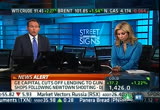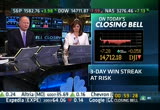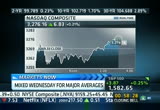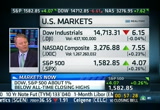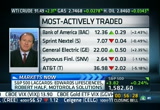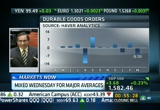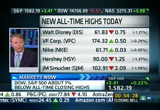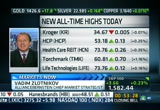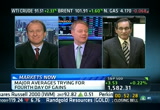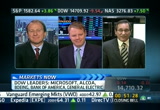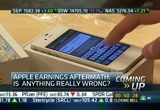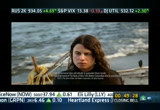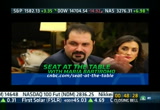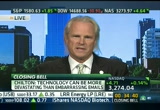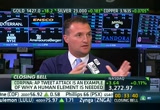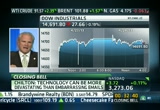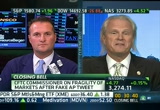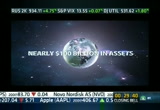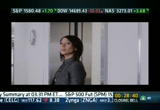tv Closing Bell CNBC April 24, 2013 3:00pm-4:00pm EDT
3:00 pm
continuing to cut off lending to gun shops is. they received a letter they could no longer lend to him. ge capital apparently not lending to gun stores, at least to a couple of gun stores. thanks for watching, everybody. >> "closing bell" is next. hi, everybody. we enter the final stretch. welcome to the "closing bell." i'm maria bartiromo at the new york stock exchange. the dow struggling to extend a three-day winning streak. it could happen. >> i think it could happen. the other major averages are higher today. i'm bill griffeth, the blue chip index really being weighed down by two stocks, at&t and prorkt and gamble following their disappointing earnings reports. boeing, though, is a real bright spot. that's been up 3.2%. coming up, we'll look at whether you should be buying the aerospace giant, now that it's nearly ready to restart deliveries, finally, once and for all, maybe, of the 787
3:01 pm
dreamliner jet. >> and then, how about apple? hovering around $400 a share, failing to impress shareholders with t earnings last night. but is wall street just overreacting to what is still a very profitable, strong company? >> tim cook admits, they are a mature technology company. doesn't make them a bad company, though, right? >> but does it make them valued at 700? >> that's the question. >> just how big a threat are the hacks like we saw at that fake ap tweet yesterday to the market's integrity. cfte commissioner bart shulton weighs in on that. he wrote an op-ed piece today and we'll get his comments, coming up. >> the dow jones industrial average down just a fraction. been a negative day all day, but we are off of the worst levels, 14,712, last trade of the blue chip average. nasdaq looks like this, highest level of the day. in positive territory, keeping in positive territory with a gain of about seven points but a quarter of a percent. s&p 500 looks like this, similar
3:02 pm
chart pattern as the nasdaq, where it too hovers a to the highest levels of the day, having reversed early losses. major averages coming off the lows of the session. can they manage to eke out the gains into the close? >> let's talk about it into "closing bell's" exchange with mike thompson from s&p capital iq is with us here at the big board and our own rick santelli is with us here. we've talked a lot about this wall of worry that continues to be a headwind for the stock market. you guys, though, say, a little worry is good for the market, right? >> i think it is. because it keeps people a little bit more grounded. investors know, you know, just yesterday, i think, you know, that could qualify as a shock. and i think people are getting more and more accepting of the fact that these things come, you can't see them coming, and it keeps people, you know, keeps them a little bit defensive. you know, what is the stock market? the stock market is a place where you're betting on the future economic prosperity of the country and the world, perhaps. but i think it's not a bad thing. and like they say, they say for
3:03 pm
a reason, bull markets climb a wall of worry. >> that's certainly what's happening. i want to get to you on earnings in a bit. because i know that the performance has been better than people thought. but let me kick it off on you in terms of investing. how would you allocate capital to this market, given what we know? >> one of the most remarkable things that have happened over the last three to five months is in the up market, you've seen dramatic, almost unprecedented outperformance by safe, defensive companies with high dividend yields. at the same time, anything levered to china or economic growth has seen significant underperformance to the tune of 10% to 15%. today we see the biggest valuation on record between the cyclical companies, which are very attractive, and those that are defensive. and even though it is quite tempting to go into the summer with a significant bias to safety, i think that would be a mistake, and i think investors could get into trouble, and therefore some cyclical exposure is warranted. >> you're not a big fan of the big dividend play right now, are
3:04 pm
you? >> well, i am, was look what happens. even today, we've seen some minor disappointments from some telecom companies and upbeat earnings, but neutral guidance from health care. and in both cases, the stocks are trading off 6% to 8%. it's a lot of premium to pay for only 2% or 3% extra dividend yield. >> rick santelli, what's a feature for you in today's market? what are you noticing right now? admittedly, it's kind of a quiet day, isn't it? >> it is a quiet day. but it wasn't so quiet from the data vantage point. you know, down 5.7 on durables today. the proxy for business capital spending was weak. and everybody, of course, looking forward to friday's first look at first quarter gdp. we still see many analysts looking for 3% or higher. so i will chen vur this. since the summer of '08, the credit crisis, there have been three quarters that have been 3% or higher. the fourth quarter of '09, the
3:05 pm
fourth quarter of '11 and the third quarter of '12. so i think that even though it's possible you can get these outliers, i think the sense of the marketplace is, is that even if we do, there's a lot of uncertainty about the economic horsepower for q2 and beyond. >> what about that horsepower, mike. let me ask you about that. earnings so far based on what we know from the first quarter, how do they look? what are you expecting the rest of the year? >> well, they're down versus last quarter, but they're better than they started out. expectations were really low, less than a percent. now we're already closing in on 3. i think what we'll probably get closer to 4. i think the better story is what's coming in the next couple of quarters. i think you have 6% and then you get 7%, 8%, and something on the order of 10, 11%. >> wait, when are you looking at 10 or 11% earnings growth. >> right now, fourth quarter. according to expectations -- >> even though right now we're at like 2%? >> that's why you raised your s&p target to 1650.
3:06 pm
>> we're trading at 14 times change next year's earnings. so i don't get too worried about people saying that we have topsy market here, because, you know, on a historical basis -- and we have a slightly different twist ton economy. if you look at four metrics, retail sales, jobs, housing, industrial production. it's getting better. you have these anomalistic number. but by far, there's more bad news than good news. that's the despite the fact you can throw everything at this economy and there are a lot of things that are not business friendly and i think the market looks okay. zbls dean, do you see 10% earnings growth in the first quarter? >> i actually do, but let me explain the reasons. one of the things that's important to remember, as you move beyond the first quarter, comparisons against last year's growth get dramatically easier. last year we started to see deceleration in europe, huge deceleration in china, and even some deceleration in u.s.
3:07 pm
so what ends up happening is we move through this year, even if you don't get very strong economic growth, year over year comparisons look quite attractive and the growth will, in fact, accelerate, and that will help some of the more economically sensitive, riskier stocks. >> i'm going to ask a loaded question to rick santelli, then. if we get that kind of earnings growth, as it progresses through the year, what do you think the fed does with that, rick? >> i think they look at it, smile, and keep doing exactly what they're doing. >> you do? they're still going to keep watching job growth more than they would earnings growth? >> yeah, well, you know win heard our guest, he's enamored with jobs, you're talking about job growth. i look at everything in a more simple fashion. there's the same amount if not more unemployed today than there was three years ago. i'm not buying into the jop market. >> let's just talk about the earnings argument, okay? we're going to go from 103 to $110. even if growth slows, we're setting record levels, and what's driving this economy, and
3:08 pm
you can see it in earnings and everyone else, it's the consumer. and the consumer -- >> do you think earnings would look as good as they do now if interest rates were normalized two or three times higher than they are and you had a ten-year note at 10.5%. i understand that corporate balance sheets are good but i still say that interest rates are artificial, so a lot of the dynamics you're using to calculate are just not the real deal. >> i'm not going to say that interest rates at these levels, rick, aren't helping. i didn't say that. i think the fed has actually done a lot to support the market. but by and large, it's helping, it's driving earnings. >> it's healthy if you're not saving any money. you know, if you have a bank account, it's not so healthy, hence the dividend stocks that pay like apple now are enamored, because investors want some s e savings and they're not necessarily going to go into stocks unless they get those dividends. i shudder to think what happens to dividend stocks under a normalization of rates. >> rick, i would rather take my chances with a basket of really
3:09 pm
high-end, high dividend-pay stocks than a ten-year yield under 2%. >> i don't disagree with that, but i think main street is not part of that program. >> aren't you guys glad i asked rick about the fed? >> always. >> thank you guys for your thoughts today. >> thanks, bill! >> we'll see you soon. >> 50 minutes before the closing bell sounds on wall street. we've got some losses within the dow, down about 12 points on the industrial average. >> shares of waist management hitting a 14-area high. when we come back, we'll talk exclusively to the company's ceo. that company's gone au naturel, natural gas, that is. we'll have details, straight ahead. and is something wrong with apple? the street seems to think so, but not consumers. coming up, experts take a look at the possibilities and we'll tell you what apple needs to do to get things back on track for that stock price. that and a lot more coming up on the most important hour of the trading day, "closing bell" on cnbc.
3:10 pm
the ocean gets warmer. the peruvian anchovy harvest suffers. it raises the price of fishmeal, cattle feed and beef. bny mellon turns insights like these into powerful investment strategies. for a university endowment. it funds a marine biologist... who studies the peruvian anchovy. invested in the world. bny mellon.
3:13 pm
shares of waste management climbing higher today, despite missing street expectations with its earnings. that stock has been hitting new highs, it's up almost 17% so far this year. what's behind all the action and what about the company's efforts to go green? they're in the midst of a ten-year green initiative. >> let's ask the man in charge, david sieberg is with us. he's waste management ceo. sir, good to have you on the program. thanks so much for joining us. >> thanks. thanks for having me. >> talk to us first about the first quarter period. the numbers missed on earnings expectations, certainly. but how would you characterize the quarter and what would you say in terms of your outlook going forward? >> you know, what i would say is that we certainly saw the momentum starting to build for us in the first quarter and it was truly a team effort. you know, we did what we did, $348 million in free cash flow, the highest free cash flow we've had in over five years. we did it through three things. we did it through cost controls, we did it through pricing and through capital discipline. so everyone in the company
3:14 pm
pitched in to have what we -- we're a company that generates a lot of free cash flow. we're driven by free cash flow and we had a great quarter when it came to free cash. >> so were the expectations just too high, because the numbers actually missed expectations. >> no, we actually had, maria, we had about three cents of accruals that we didn't expect at the beginning of the year related to compensation and bad debt, and so, you know, really, if you looked at it on a normalized basis, i think wall street realizes that on a normalized basis, we probably would have done 43 cents, which would have been ahead of consensus, but we did announce 40 cents. >> you had announced restructuring plans last year that included cuts of about 700 jobs. is that it? are you looking for more? how are you in that whole process right now? >> bill, you're always lacki lo for more. so what we did last year were our labor savings now we're looking at non-labor savings. so this quarter on a normalized basis, we would have had about a $39 million improvement in sg&a.
3:15 pm
>> what can you tell us about natural gas, what you've already done, what fueling stations have done for your own trucks and why this is such a big opportunity. >> yeah, about -- maria, about 90% of the trucks we buy every year are going to be cng trucks. the different national fuel is tremendous for us. it's about $2.50, $3 a gallon right now. so we're buying about a thousand cng trucks a year and putting in our own fueling stations around the country, that not only service us, but can service the general public. >> yeah. and green overall is, as i mentioned earlier, you're in the midst of a ten-year green initiative to begin, about five years in here. if i read your earnings correctly, the cost or the price for recyclable commodities had gone down, and i'm wondering if that means that it's less cost effective or profitable to recycle in some cases,. does the incentive, is it reduced for when prices go down
3:16 pm
for recyclable commodities? is that what we're learning here? >> it makes it more difficult, and you have to look at the different recycled commodities. what we talked about today is glass, and glass is by weight our second largest recyclable component. and glass is very difficult on our equipment, and there are very few markets for the glass. so we need to start to understand the value of the different components in our recyclable stream and charge accordingly. so we've talked about putting a glass surcharge in, so for folks who want to recycle glass, it's going to cost a little bit more. for folks that want to recycle commodities the that are valuable, we're going to do is that, with cardboard fiber, we're going to continue to recycle lots of those materials. >> but with a slower economy, then, if it's going to cost more to recycle, we all pay the lip service, it's good to recycle, we all know that, but if it's going to cost more and be less profitable, is the incentive reduced? that's my question? are fewer companies going to recycle then? >> no doubt that the incentive's going to be reduced. look, i always say that it's
3:17 pm
very easy to drive recycling rates. you need three things. you need the consumer to want to do it. you want businesses to be able to profit by it and you want governments to facilitate it. if you have businesses that can't profit by it, certainly it's going to be more difficult. but we need to make sure we can do it at the lowest cost possible and we can extract the value out of the materials that the customers do have. not all commodities are down. metals are fine, most of the fiber prices are fine. we need to find a way that we're recycling the right materials that create the right value and the right incentives for people to recycle. then we've got governments that are helping us to recycle with a company we call recycle bank, which will give consumers rewards for recycling and that will generate more material. and it's both a price and volume game. the we can get more volume, that will make up for a drop in price. if we can incentivize more people to recycle through things like recycle bank, that will take care of some of the problems too. >> let me ask you about your
3:18 pm
free cash flow. you talked about $348 million of free cash flow in the first quarter. what are the plans of allocating capital in terms of dividends and buybacks? >> maria, we've had a very robust dividend for the last ten years since i've been here as ceo, we've grown it every year. we intend to continue to do that. a good portion of our free cash flow will go to the dividends, about $700 million. beyond that, we're going to look at three different things. at acquisitions that can be accretive to us, going to look at a shiare buyback, and then we'll look at paying down debt. at this point in time, we'd like to gravitate a little bit more towards paying down debt. and in the back half of the year, as we see the cash flow shape up, i would i would like to be in the market buying our stock. >> all right. we'll leave it there. good to have you on the program. thank you so much. >> thank you. >> see you soon, sir. tonight on "mad money," clean energy ceo andrew littlefair weighs in on the natural gas
3:19 pm
businesses. meantime, we're headed toward the close. 40 minutes left in the trading day. the dow now down 29 points. we'll see if we can turn positives. >> lots to talk about with that fake tweet yesterday. we'll talk with bart shillton yesterday to talk about whether that poses a real threat to the market's integrity. thank god for the humans, bill! >> yes, indeed. thank god for humans. boeing blowing away wall street's earnings estimates despite all its dreamliner problems lately. when we come back, we'll find out if this stock is ready to take off. stay tuned. anning process, it's easy to follow the progress you're making toward all your financial goals. a quick glance, and you can see if you're on track. when the conversation turns to knowing where you stand, turn to us. wells fargo advisors. [ agent smith ] i've found software that intrigues me. it appears it's an agent of good.
3:20 pm
ge has wired their medical hardware with innovative software to be in many places at the same time. using data to connect patients to software, to nurses to the right people and machines. ♪ helping hospitals treat people even better, while dramatically reducing waiting time. now a waiting room is just a room. [ telephone ringing ] [ static warbles ] [ beeping ] red or blue? ♪
3:22 pm
welcome back. tuesday's fake tweet from the associated press twitter account regarding an attack on the white house, sending the u.s. markets down sharply before the rebound, it's raising new red flags on the fragility of financial markets. >> we want to talk about this. bart chilton wrote a guest blog on cnbc.com today about the episode yesterday and the dangers that technology can play in moving financial markets. pretty valid op-ed piece. also with us, our friend, jonathan kor pooens, with meridian eck partners, who experienced this all yesterday. we were all joking, thank god for the humans, but they did play a role in this yesterday. >> absolutely. >> moderating it all. >> the way the market traded and reacted to this information that came out was extraordinary. something that we've never seen before. and what it comes down to is
3:23 pm
that there are algorithms that are out there, there's program trading that's out there, key words that are out there and they focus on that. when they see negative news headlines come out, they kick in, they automatically start trading, and there's other that look for volume spikes, moves in the market. and in an instant, these start playing off each other and start feeding off each other, sell programs come in, buy programs cancel, and we get a liquidity that drys up in the markets and then we saw that big downturn in the market. >> commissioner, i know you're listening to this. so i want to, you know, jonathan explained it so well just moments ago and has been talking about it all day. the fact that we have algorithms, algos, as you call them, that just have words programmed that if you see these words, "explosion," "president hurt," whatever, it goes into -- takes effect and starts selling everything. isn't that dangerous, president
3:24 pm
chilton? what is that incidence with the alg riorithms can that go just o play because of these words. can that not be corrected? >> maria, it is a problem, in general. i think it's a large problem with regard to tlng, in general, that, you know, we've just sort of accepted it, we all know that nothing good ever comes from mistakenly hitting reply all, but in today's world, it can impact markets when a mistake is made, and that can cost people money. and it did yesterday. even though the markets are resilient, they went down and they went back up, as john was explaining, people were in the markets, some people still lost a lot of money. so just like, you know, nobody's against technology, and just like everybody has a car and there are rules of the road, we need certain rules of the road for technology, and that's particularly true with regard to the advent of social media, maria and bill, because -- >> but we don't have those rules, right? >> we may not have the
3:25 pm
cybersecurity we have had in the past. >> but that's the point, we have no rules. >> that's the thing. as unsettling as yesterday's episode was, your job is to regulate this market. do you feel there's a need for a new regulation of some kind that would keep that from happening, if that's at all possible? >> well, i don't know that we should get into sort of, you know, engineering how the social media system is going to work throughout the country. but i do think with regard to these high-frequency traders, who i call cheetah traders, because they're so fast, fast, fast, they're not even required to be registered with our agency. there's no requirement that they test their programs before they get put into the live production environment. there's no requirement that they have kill switches in case their cheetah programs go feral. so there's a lot of things that we do need to do that are sort of basic rules of the road for technology. we shouldn't just accept technology blindly, that it's all good, that faster is better, that bigger is better. sometimes it's not. and we saw so yesterday.
3:26 pm
>> accept more rules if they come down the pike? i know it's an anathema to wall street to add more rules to the equation, but in this case -- >> i'm all for it. the technology has advanced faster than our market structure has moved forward. let me point out a few things, when we had the flash crash, nobody saw that coming, and then we realized human interaction played a big part of that and prevented a bigger problem than there was -- >> in 2010, you're talking about? >> yes. >> may 6th. >> go to the scenario, we had a situation that no one could have predicted happening and humans got involved there and were able to stop the volatility in the market. what we saw yesterday, no one could have predicted, no one expected this to happen, and once again, we had humans here who were able to view what was going on, realize that there was no confirmation on this headline that was out there, and realize very quickly that this was not -- >> put the brakes on the selling. >>brakes on the selling. so i guarantee you there's going
3:27 pm
to be another thing that happens again. what we need is tighter rules and regulations, speed bumps that are put in place. >> right, in the meantime, commissioner, you said a moment ago, look, people lost money. what happens to those people who lost money because the algorithms traded the way they did and went down 143 points. is anybody going to make those people whole because of problems with technology and these algorithms or, no, it's done? >> the algorithms are the ones -- it's the people who had like stop-loss orders in there, you know, maria, that they just said, sell at this price and the market bounced back up and they didn't get back in. but the cheetahs, the high-frequence traders, they made money when the market went down and made money when the market went back. research that we've done shows that really, who they make the most money off of, who the high-frequency traders are make the most money from is when they're trading with smaller retail investors. they make, on average, $3.49 for a $50,000 trade. but we are going to see this
3:28 pm
again, john's right. just think if this had been more than just the ap hacking. what if it was, you know, cnbc, heaven forgid, or this same group hacked or took responsibility for hacking into national public radio and cbs recently. so if it was a more focused attack, it could have been even worse. >> but you keep calling the high-frequency traders the cheaters -- >> the chooeetahs. >> no, no, no, cheetahs -- >> yeah, i get it. but if you take high-frequency traders or these cheetahs out of the market, are you eliminating liquidity that needs to be there? are you taking out a big portion of the liquidity and actually, perhaps, utter hing things by doing that? you can't take the hfts out, right? >> it's a good question and they do provide liquidity, but it's gone like that. you want somebody to hedge your energy risk or soybean risk for five seconds, i've got just the
3:29 pm
catch for you. a lot of things i've been seeing, like this terror hacking, they're called ignition momentum in markets. they start a feeding frenzy. we've also seen where there are traders, high-frequency traders, the cheetahs, who actually wash their programs, they trade with themselves, at times, in vvolums instances, because when these guys make their money is when they're trading, when there's a feeding frenzy. so these are all questions we need to answer. and dodd/frank, which was just done in 2010. we've got our work cut out for us. >> once again, technology is ahead of the rulemakers, as often happens. >> makes sense. >> thank you, john. and thank you so much, commissioner. >> by the way, later on "closing bell," more on the dangers of twitter and the market. we have cnbc's jeff cox and bob pisani weighing in on that in a little bit here. meanwhile, we have a market
3:30 pm
that has been worsening, down about 27 points on the dow jones industrial average, s&p 500 and the nasdaq still positive, but certainly a mixed showing at this point. forget sell in may this year. abby joseph cohen will be with us. she explains why goldman sachs is upgrading its outlook for stocks this summer. that's coming up. >> also, is apple really losing its shine or are investors unjustifiably sour of the company's earnings. we'll decide the debate on apple, coming your way. stay with us. i know what you're thinking...
3:31 pm
transit fares! as in the 37 billion transit fares we help collect each year. no? oh, right. you're thinking of the 1.6 million daily customer care interactions xerox handles. or the 900 million health insurance claims we process. so, it's no surprise to you that companies depend on today's xerox for services that simplify how work gets done. which is...pretty much what we've always stood for. with xerox, you're ready for real business.
3:33 pm
welcome become. apple shares lower today despite beating wall street's earnings expectation last night when the company reported. but take a look what's happened in the last couple of minutes. the stock is in positive territory, reversing earlier losses at $406.73. seema mody breaking down why apple matters so much to the rest of the market. >> besides having the largest weighting on the nasdaq 100, according to a recent report, apple is the fourth most held stock by mutual funds and it might be entering the fixed income space. ceo tim cook says apple will be tapping the debt market to fund its capital allocation plan. it says it's not using its own cash because a significant amount is overseas and bringing a that back into the u.s. would
3:34 pm
require apple to pay a high tax rate. s&p just gave apple a double a plus rating, which is the same rating as the u.s. government. most people say an apple bond would be well received by the street, as there's a strong demand for high credit-quality bonds. it would also give fixed income and value investors a new place to put cash to work. maria? >> seema, thank you so much. so is wall street too negative on apple and does the technology community feel the same about analysts? >> let's talk with max wolf, back with us, and scott stein is senior editor with cnet.com. so max, tim cook admits that apple is a mature technology company. they're increasing the dividend, they have this massive buyback to put some of this cash to work. can we officially now declare this the end of the steve jobs era at apple? >> yeah, i think we probably can pch i think apple decided that for the foreseeable future, it was better to try to be an
3:35 pm
irresistible value play than a much more questionable growth play, although i think there's a good chance we'll see them return to the growth orbit. and i think it's a little bit overdone here on the negative side. this is not the next research in motion, this is not the next nokia. it's just a company that has to decide between margin and market share. i don't think they've done that yet. until they do, they're a value play. >> that's really an interesting way to put it. but then why has the stock lost 50% of its value from the highs? >> that's great question, as always, maria. i think when the bloom comes off the rose, the reaction is as excessive to the downside as it is the upside. it's almost a universal law of inverse proportionality here. i think the story is such that from a value perspective, with a possible growth upside, that even at $500, the tip weight is to the upside, not the downside, and they've kind of gussied themselves up says an irresistible value story in the erpgs call yesterday. >> scott, for years, apple was able to stay ahead of
3:36 pm
competition with new innovation. they always had the competitors coming in the with the lower cost, second versions of whatever they were innovating. but now they have competitors coming out who are out-innovating them and beating them in cost. what do you think apple's strategy should be here? >> i think we're in an industry that's in transition. you're looking at computer devices that are in flux. apple has had strong iphone and ipad sales, which sounds promising, but they're holding back on what they claim are going to be new products until fall or maybe 2014. you know, they've been it rating on similar products for years and we've been waiting for a watch or maybe a tv. it may be better to build and grow those in a smart way, because uh yo don't want to fail at them. and if they grow the ipad, which i think has a lot of direction still, into what could be the future of computing, they be that could be really exciting. but we haven't seen a new product category under tim cook yet. so it's hard to judge.
3:37 pm
>> yeah, but you know, there was a big fear that when steve jobs died, there would be an innovation gap. and the people who went to apple, following steve jobs, would perhaps think twice about it. so, you know, you see samsung unveiling new products today, in the face of apple's week, what do we really need more that you think apple can innovate? >> i think we need to see that they can make a real decision between the incredibly high 35% plus margins and the market share they've had. i think the history of consumer electronics tells us that both is great for a while, but can't last. and i think they need to pivot the public's attention. apple's not a computer company. they sold 4 million computers and 55 million iphones and ipads. and i think they need a more successful new product under cook than the ipad mini, which is already under some kind of a risk, from devices like the fire, from kindle, why is a tough competitor, amazon, who's a margin killer, and also the
3:38 pm
nexus 7, which is a good product from google. they're sort of getting sandwiched by the two margin assassins of tech, amazon and google. >> you're also dealing with such a huge gap. it's been october since we've seen a new product and no other company has had that long period of time. so you need more products too. and i think that's a problem, as this period of anticipation doesn't fit with the release cycle of most other companies. >> but even then, that new product was a new version of the ipad and we haven't had a new -- you know, the ipad came out in 2010, so we haven't really had a new innovation, a transformational technology innovation in three years from this company. but i digress. and i'm not sure the watch is the answer to that, by the way. >> or the -- >> can you see the two of us -- no. >> you stopped wearing a watch, because you have devices with the time. a lot of people have stopped wearing a watch. >> who wears a watch? >> we do, but we're nerds. >> we're throwbacks.
3:39 pm
>> where we were? 20 minutes left, heading lower. doesn't look like the dow is going to if i were higher today, we're down 33 points right no uh. >> boeing announcing strong earnings, saying it's going to restart the dreamliner deliveries next month. up next, we'll take a look at if this will help the stock fly to new heights. >> and senator david vitter announcing bipartisan legislation to end too big to fail in the banking industry, but will it be able to get through stiff opposition in congress? senator vitter will weigh in by 4:30 eastern time. by my watch, that's about 50 minutes from now. stay tuned. combining your customized charts with leading-edge analysis tools from recognia so you can quickly spot key trends and possible entry and exit points. we like this idea so much that we've applied for a patent. i'm colin beck of fidelity investments. our integrated technical analysis is one more innovative reason serious investors are choosing fidelity. now get 200 free trades
3:41 pm
and never back down. who believe the american dream doesn't just happen, it's something you have to work for. ♪ we're for those kinds of people. because we're that kind of airline. and we never stop looking for a better way. it's how we've grown into america's largest domestic airline. we are southwest. welcome aboard.
3:42 pm
a new 52-week high today. by my chart, i think it's a five-year high. after the aerospace giant beat earnings expectations and said it would resume deliveries of its troubled dreamliner by mid-may. with shares up over 20% just this year, is it too late to get on board, boeing, and add it to your portfolio? let's start talking numbers on
3:43 pm
boeing today, on the technical side is j.c. o'hairya with phoenix partners group. on the fundamental side is jeff killberg with kkk financial. good to see you both. this chart has had a good ride, going back to 2009. >> that's correct. and we're going to start looking at 2007 pretty darn soon. even the faa could not ground this stock chart. it wants to go higher. it was grounded under '77 for 3 1/2 years. and finally this year, the stock broke higher. i would love to buy this on any sort of pullback, but longer term, you know, put the seat back, relax, loosen the seat belt. this stock wants to go to 105. >> the animal way the trade off of that chart is going to fly is if you fold it up and make it a paper airline. it's a 52-week high, it's come a long way, 27 year-to-date, great earnings, but the time to buy is when they were grounded for the batteries, not when they're about to get back in the air.
3:44 pm
so we are seeing right now a bigger short interest come into this name here. we're seeing potential, you know, the lag, the way sequestration works, bill, you're going to see a lag. this could be a situation as we go into summer and fall, sequestration hits us. but we like this company on a pullback. it's based in chicago, i'm a big fan of boeing, but way too expensive here. >> jeff, why don't you hop on a plane back to chicago with all of that. >> whoa, whoa, whoa! >> joe! >> jeff, let's look at the boeing's technical flight list. first we have positive momentum, check. higher trends, check. we have great earnings, check. that tells me the stock wants to go higher -- >> well, j.c., i pulled about 15 different analyses here and we're all bullish here in the mean. the average upside to their call was 5%. there's no risk/reward in that chain for us. we're out, we're buying it lower. it's all yours. you are sailing the skies solo, my friend. >> i'll fly higher right from here, jeff. >> all right. there it is, bill. >> i guess we've reached a conclusion of some kind here.
3:45 pm
>> i had to pull the rip cord. >> good stuff, guys. thank you for your thoughts on boeing today. see you later. all right, we're in the final stretch of trading for the day. we've got a mark that is mixed. the dow industrials down now almost 40 points. s&p and the nasdaq still positive that the hour. >> let's see, i think -- >> 41 points. >> we're at the lows for the day right now, as a matter of fact. okay. up next, goldman sachs, abby joseph cohen explains why she feels stocks are still attractive. >> and investors are also putting money to work in japan. ceo of mizuho securities usa will join us. back in a moment. tdd#: 1-800-345-2550 when i'm trading, i'm so into it, tdd#: 1-800-345-2550 hours can go by before i realize tdd#: 1-800-345-2550 that i haven't even looked away from my screen. tdd#: 1-800-345-2550 tdd#: 1-800-345-2550 that kind of focus... tdd#: 1-800-345-2550 that's what i have when i trade.
3:46 pm
tdd#: 1-800-345-2550 tdd#: 1-800-345-2550 and the streetsmart edge trading platform from charles schwab... tdd#: 1-800-345-2550 ...helps me keep an eye on what's really important to me. tdd#: 1-800-345-2550 it's packed with tools that help me work my strategies, tdd#: 1-800-345-2550 spot patterns and find opportunities more easily. tdd#: 1-800-345-2550 then, when i'm ready... act decisively. tdd#: 1-800-345-2550 i can even access it from the cloud and trade on any computer. tdd#: 1-800-345-2550 with the exact same tools, the exact same way. tdd#: 1-800-345-2550 and the reality is, with schwab mobile, tdd#: 1-800-345-2550 i can focus on trading anyplace, anytime... tdd#: 1-800-345-2550 tdd#: 1-800-345-2550 ...until i choose to focus on something else. tdd#: 1-800-345-2550 all this with no trade minimums. and only $8.95 a trade. tdd#: 1-800-345-2550 open an account with a $50,000 deposit, and get 6 months commission-free trades. tdd#: 1-800-345-2550 call 1-800-578-4439 tdd#: 1-800-345-2550 and a trading specialist tdd#: 1-800-345-2550 will help you get started today.
3:48 pm
well, maybe forget about sell in may this area. goldman sachs has upgraded its outlook for stocks, citing a much more appealing valuation on equities versus bonds. but why, you ask. >> let's get to the bottom of this with goldman sachs's abby joseph cohen, who joins us right now. abby, wonderful to have you back. welcome back. >> thanks so much. >> so why get more bullish on equities now?
3:49 pm
give us the 411 on this new call? >> it has nothing to do with technical analysis, obviously. it's all about the fundamentals and the valuation. look, we see that there are various weaknesses in the global economy right now, just like everybody else. but it's a question of what's priced in. and our feeling is that another major recession is unlikely in this investment horizon, and given that assumption and given some conservative profit estimates that we're making, we think that equities, in many different markets around the world, offer good possible outcomes, and at the same time, we are concerned that interest rates, again, in many countries, are near their lows for the cycle. so when you put those two things together, we see potential risk, not right away, but over the next period of time, in fixed income, much less risk in equities, and a higher potential return in the stock market. >> one fundamental that you have to take into account for right now, abby, obviously is the
3:50 pm
federal reserve and its monetary policy. it's very, very easy monetary policy right now. how much of that is in there and when do you -- what do you think the markets will do when they start beating the drum a little louder about starting to pull back on that $85 billion a month in bond purchases? >> sure. bill, our economics team believes that the federal reserve still has some time to go before it needs to actively pull in those reins. but the interesting thing is the that everyone is already talking about it. it's not like it's going to be a big surprise to anyone in the markets. and we've already seen that the yield curve is steepening. so while the fed can have more control over the shorter term rates, we are seeing some intermediates and longs move higher. nevertheless, when we do valuation work on the fixed income markets, compare yields, for example, to inflation, our concern is that those yields are not properly reflecting the likely inflation over the next handful of year. >> what groups, abby, do you
3:51 pm
want to be exposed to, given this call? some of the international, multi-national companies are seeing some pressure because of the slowdown, you know, in the global economy. you look at a fedex, at a caterpillar, so where do you think you get the most bang for the buck, if, in fact, you do want to go long equities here? >> you're certainly pointing out, correctly, maria, that there have been some disappointments, some deceleration in the pace of global trade. but our feeling is that many u.s. companies can do fairly well, nevertheless. they have very commanding market share, they have good margins, and so on. and by and large, we're looking at the economically sensitive names. again, it becomes a question of valuation. a lot of the things that investors are nervous about may already be priced in and therein lays the opportunity for u.s. investors. we also think that those companies that are making the longer term bets in terms of investing not just for this quarter and next, but long-term
3:52 pm
future, some of the innovative research and development that will give them the product cycles of the future, this is where much of the opportunity probably lies. >> obviously, u.s. market had a stellar further. much was made of the fact that a lot of the defensive issues, defensive sectors were the leaders in that, in those gains that we saw in the first quarter. do you like defensives at these levels? and those dividend payers, that everybody seems to be so enamored, so that they can find some source of income right now. >> i think that was the point, really, bill, that there were many investors who wanted to increase their exposure to the equity markets, because they, too, are concerned about having too much, if you will, in low-yielding cash, and in fixed income, where when yields go up, the prices go down. so we did see a move into so-called defensive names. that is less exposure to the economy, but also, companies that generate large dividend yields. the thing that we would be
3:53 pm
looking at is not high-yielding securities, but, rather, those securities, those companies that can increase their dividend. that is, grow the dividend. history shows that it's the higher-yielding securities that basically don't have much else to do with their capital. investors tend to be better off when they combine two things. return on invested capital and growth in dividends. that is good cash flow, not all of it going to dividend, a good portion of it going to future growth of the company, including that long-term investment in r&d that i mentioned a few moments ago. >> that's a real sweet spot right there, abby. abby, let me get your take on when the fed might start the exit. if you're expecting no recession, a broad economy that is improving slowly but surely, a global economy that you're expecting to see real growth pick up, i've got here, you're expecting global growth from 3% in 2012 to 3.2% in 2013, and then accelerate to 4.1% in 2014.
3:54 pm
if that's the case, when would the fed start pulling it in? >> well, the thing to keep in mind, maria, is that there's enormous disparity in that forecast. so, for example, we do believe that the chinese economy will see some reacceleration during this period of time. europe will be delayed somewhat. so much depends upon what's going on in various economies and what their central banks are doing as well. let's keep in mind that for a good period of time, the federal reserve has acted as the effective central bank of much of the global economy, in part because the other central banks found themselves without the appropriate tools. but now that the bank of japan is stepping in, now that there are some signs that the ecb may be taking more stimulative action, that takes some pressure off the fed. but by and large, we think the decisions to be made by the fed will be based upon domestic considerations. for example, is the labor market
3:55 pm
sufficiently robust that they feel comfortable making monetary policy less easy than it is? and those are going to be very important considerations on the domestic front. >> abby, thanks so much. >> thanks, abby. >> good to talk to you, as always. >> we'll see you soon. >> a lot of noise behind us. some of the top college football prospects will be participating in the nfl draft over the next three days, are behind us. so a room full of very large men. >> yeah, the national football league and the nfl draft prospects right behind us, and i'll tell you, lots of snapping going on, pictures. >> very exciting. we'll come back with the countdown in just a moment. >> and qualcomm set to report earnings after the bell. we have the instant analyses after those numbers come out. you're watching "closing bell" on cnbc, first in business worldwide. ♪ [ male announcer ] every car we build must make adrenaline pump and pulses quicken. ♪ to help you not just stay alive...
3:56 pm
but feel alive. the c-class is no exception. it's a mercedes-benz, through and through. see your authorized mercedes-benz dealer for exceptional offers through mercedes-benz financial services. i honestly loved smoking, and i honestly didn't think i would ever quit. [ male announcer ] along with support, chantix (varenicline) is proven to help people quit smoking. it reduces the urge to smoke. it put me at ease that you could smoke on the first week. [ male announcer ] some people had changes in behavior,
3:57 pm
thinking or mood, hostility, agitation, depressed mood and suicidal thoughts or actions while taking or after stopping chantix. if you notice any of these stop taking chantix and call your doctor right away. tell your doctor about any history of depression or other mental health problems, which could get worse while taking chantix. don't take chantix if you've had a serious allergic or skin reaction to it. if you develop these stop taking chantix and see your doctor right away as some can be life-threatening. tell your doctor if you have a history of heart or blood vessel problems, or if you develop new or worse symptoms. get medical help right away if you have symptoms of a heart attack or stroke. use caution when driving or operating machinery. common side effects include nausea, trouble sleeping and unusual dreams. with chantix and with the support system it worked for me. [ male announcer ] ask your doctor if chantix is right for you. ♪ [ indistinct shouting ] [ male announcer ] time and sales data. split-second stats. [ indistinct shouting ] ♪
3:58 pm
it's so close to the options floor... [ indistinct shouting, bell dinging ] ...you'll bust your brain box. ♪ all on thinkorswim from td ameritrade. ♪ two minutes left. we're hitting lows for the session right now, with the dow down 51 points. but we're waiting for more earnings. earnings just keep coming, folks. tonight, we're waiting for qualcomm and the mobile gaming company, zynga. qualcomm, we're looking for a profit of $1.17 on $6.09 billion. and that stock's up 1.25%. but look at zynga. they're looking for a loss of three cents on revenue of $210 million. that stock up 5% right now. alan valdez, you like zynga? have you played angry birds?
3:59 pm
>> i've seen it, but i haven't played it. >> me either. i have no idea what that's all about. >> but you're right, after the close, we get over 100 companies reporting today. after the bell. >> we are in the sweet spot this week. what do you make of the market's response to all these earnings? for the most part, they're taking them all in stride. >> they are. it's really not surprising. we thought they would beat, on the bottom line, revenue would be a little weak. >> it's one thing to be able to cut costs enough to get the profit up, but if revenue doesn't continue to grow, you've got a problem here, don't you? >> you definitely have a problem here. i still think you'll see slow growth, but it's definitely starting to change some momentum here in the market. >> but they're raising their price targets for a lot of these averages. s&p capital like you up to 1650 and looking for 10% earnings growth for the end of the year. do you see that? >> i don't see that. that's a little high end. we're looking a little less than
585 Views
IN COLLECTIONS
CNBC Television Archive
Television Archive  Television Archive News Search Service
Television Archive News Search Service 
Uploaded by TV Archive on

 Live Music Archive
Live Music Archive Librivox Free Audio
Librivox Free Audio Metropolitan Museum
Metropolitan Museum Cleveland Museum of Art
Cleveland Museum of Art Internet Arcade
Internet Arcade Console Living Room
Console Living Room Books to Borrow
Books to Borrow Open Library
Open Library TV News
TV News Understanding 9/11
Understanding 9/11